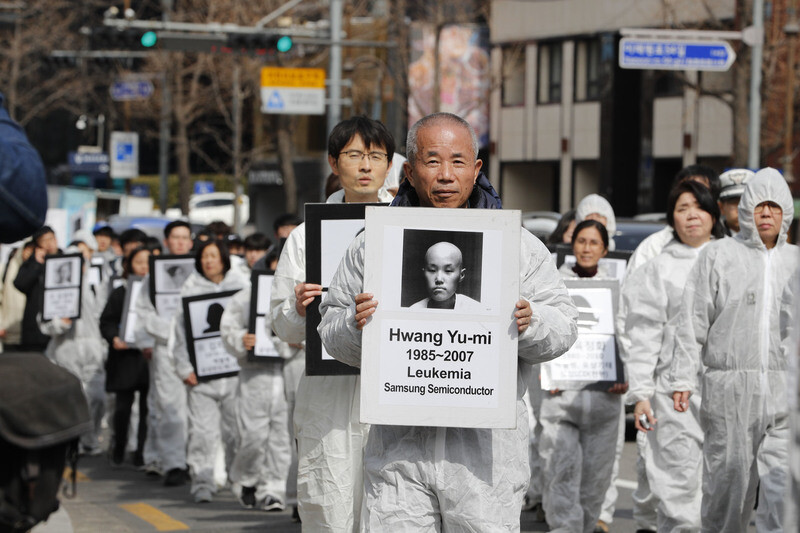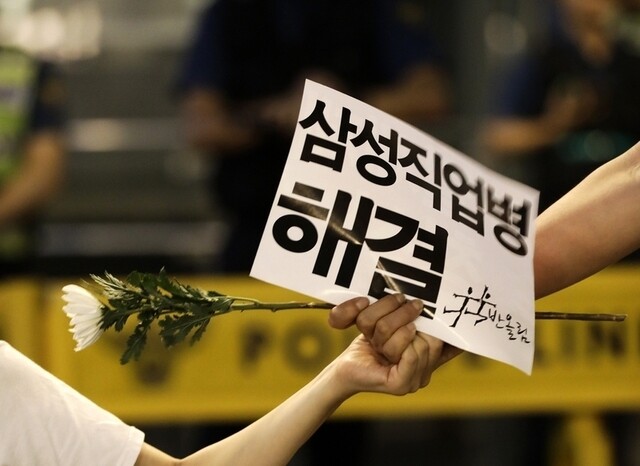hankyoreh
Links to other country sites 다른 나라 사이트 링크
Samsung’s acceptance of offer by arbitration committee likely influenced by vice chairman’s upcoming trial

Samsung Electronics’ decision to accept the “final” proposal by the arbitration committee appears to have been substantially influenced by Samsung Electronics Vice Chairman Lee Jae-yong’s upcoming trial at the Supreme Court on charge of bribery. According to this view, Lee accepted a solution to the issue of the leukemia cases at the company’s semiconductor factories – a matter that had gone unsolved for ten years – as a way to boost his social credit.
Since this method of arbitration, which is referred to as a “blind trust,” is predicated on accepting whatever remedy results from arbitration, it places a significant burden on Samsung, the party that will have to pay restitution. While the general framework for the arbitration – including the timeline, process and topics – is in place, the specifics are still unknown. Regardless, the company accepted the arbitration committee’s proposal on July 21, ten years after the issue of leukemia became emerged at its semiconductor plants, apparently concluding that the proposal’s advantages outweigh its costs.
During the first attempt at arbitration by the committee in 2015, the parties involved came very close to a breakthrough, but the talks broke down when Samsung rejected the committee’s proposal for the establishment of a public interest foundation. Since then, the leukemia issue had remained one of the chief examples of Samsung’s backward approach to labor rights, but the company had shown no signs of proactively seeking a solution.
Last April, Samsung Electronics Service (Samsung SVC), a subsidiary of Samsung Electronics, reached an agreement to directly hire around 8,000 subcontractor employees. The decision brought an end to the “no union” policy Samsung Electronics had adhered to for nearly 50 years – a move analysts viewed as both a last-ditch strategy amid an intensifying investigation by prosecutors and a bid to restore trust in Lee Jae-yong ahead of his trial.
At the moment, Samsung is working on ideas to restore the images of Lee and the group as a whole after they hit rock bottom over the Choi Soon-sil government interference scandal and various issues that surfaced in its wake.
“The semiconductor leukemia cases are a deep-seated issue that has been going on for 10 years,” explained one business world source.
“Judging from the way they’re pursuing resolutions now on the ‘no union’ issue and the leukemia issue, it looks like they have Lee Jae-yong’s trial in the back of their minds,” the source suggested.

Samsung said its decision to accept arbitration was not based on the trial.
“This is the first time an arbitration proposal has been put forth,” a Samsung official said.
“It would be one thing if we were accepting this now after rejecting [proposals] in the past, but we accepted it because we believed we could resolve the issue now,” the official continued.
Another factor appears to have been the conclusion that arbitration represented the only means of resolving the semiconductor leukemia issue. Over the past ten years, Samsung Electronics has adopted a number of approaches to discuss the issue with victims and victim groups – including direct dialogue, negotiations between representatives, and mediation – but the matter has remained unresolved. Observers suggested the situation had become too complicated to be resolved by presenting a mediation plan for the two sides to either accept or reject.
The clear battle lines drawn by the arbitration committee also appear to have contributed. In this proposal it sent to Samsung Electronics and the victims’ rights group Banollim, the committee said it had “determined that it would be beneficial to hold renewed mediation procedures to bring a resolution to the issue, or else declare an end to the arbitration committee’s activities and open the way toward finding a new means of resolution.” It was a tactic that applied pressure on both sides by implying the proposal might represent the committee’s final action.
“They may have concluded the issue would not be resolved through any other means except one presupposing acceptance,” a business world source said.
“Samsung Electronics and Banollim may have thought the issue needed to be resolved after arbitration committee chairman Kim Ji-hyung – someone they at least trust – took action.”
By Choi Ha-yan, staff reporter
Please direct comments or questions to [english@hani.co.kr]

Editorial・opinion
![[Column] Season 2 of special prosecutor probe may be coming to Korea soon [Column] Season 2 of special prosecutor probe may be coming to Korea soon](https://flexible.img.hani.co.kr/flexible/normal/500/300/imgdb/original/2024/0426/3317141030699447.jpg) [Column] Season 2 of special prosecutor probe may be coming to Korea soon
[Column] Season 2 of special prosecutor probe may be coming to Korea soon![[Column] Park Geun-hye déjà vu in Yoon Suk-yeol [Column] Park Geun-hye déjà vu in Yoon Suk-yeol](https://flexible.img.hani.co.kr/flexible/normal/500/300/imgdb/original/2024/0424/651713945113788.jpg) [Column] Park Geun-hye déjà vu in Yoon Suk-yeol
[Column] Park Geun-hye déjà vu in Yoon Suk-yeol- [Editorial] New weight of N. Korea’s nuclear threats makes dialogue all the more urgent
- [Guest essay] The real reason Korea’s new right wants to dub Rhee a founding father
- [Column] ‘Choson’: Is it time we start referring to N. Korea in its own terms?
- [Editorial] Japan’s rewriting of history with Korea has gone too far
- [Column] The president’s questionable capacity for dialogue
- [Column] Are chaebol firms just pizza pies for families to divvy up as they please?
- [Column] Has Korea, too, crossed the Rubicon on China?
- [Correspondent’s column] In Japan’s alliance with US, echoes of its past alliances with UK
Most viewed articles
- 1‘We must say no’: Seoul defense chief on Korean, USFK involvement in hypothetical Taiwan crisis
- 2N. Korean delegation’s trip to Iran shows how Pyongyang is leveraging ties with Moscow
- 3‘Weddingflation’ breaks the bank for Korean couples-to-be
- 4Korea sees more deaths than births for 52nd consecutive month in February
- 5[Editorial] New weight of N. Korea’s nuclear threats makes dialogue all the more urgent
- 6[Column] Has Korea, too, crossed the Rubicon on China?
- 7[Column] Park Geun-hye déjà vu in Yoon Suk-yeol
- 8[Guest essay] The real reason Korea’s new right wants to dub Rhee a founding father
- 9Amnesty notes ‘erosion’ of freedom of expression in Korea in annual human rights report
- 10[Reportage] On US campuses, student risk arrest as they call for divestment from Israel